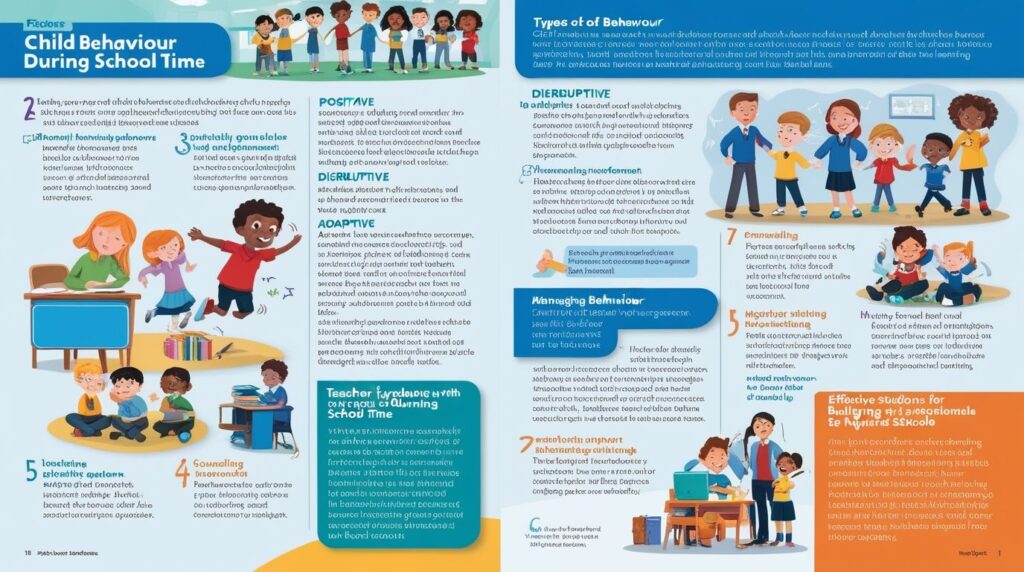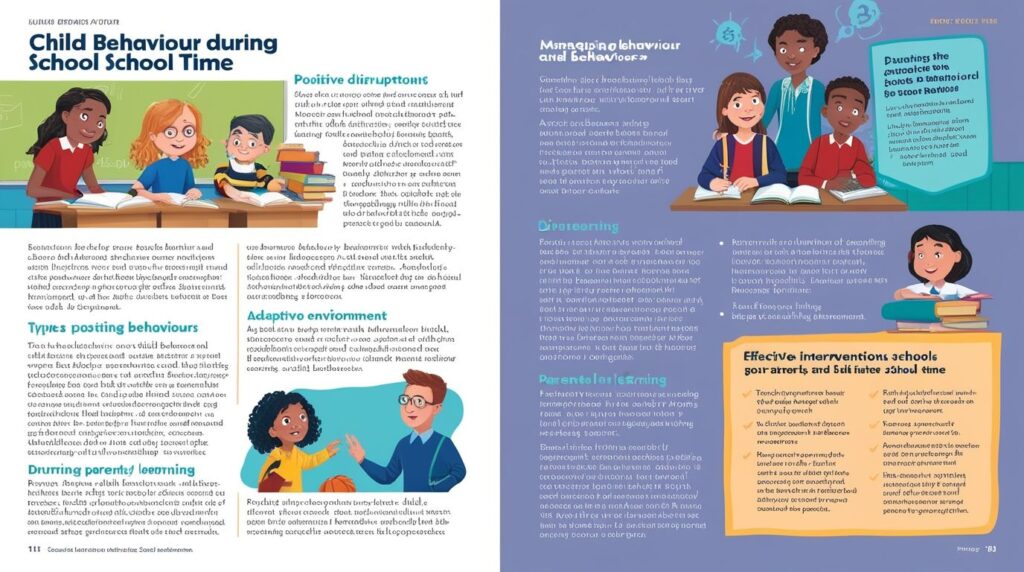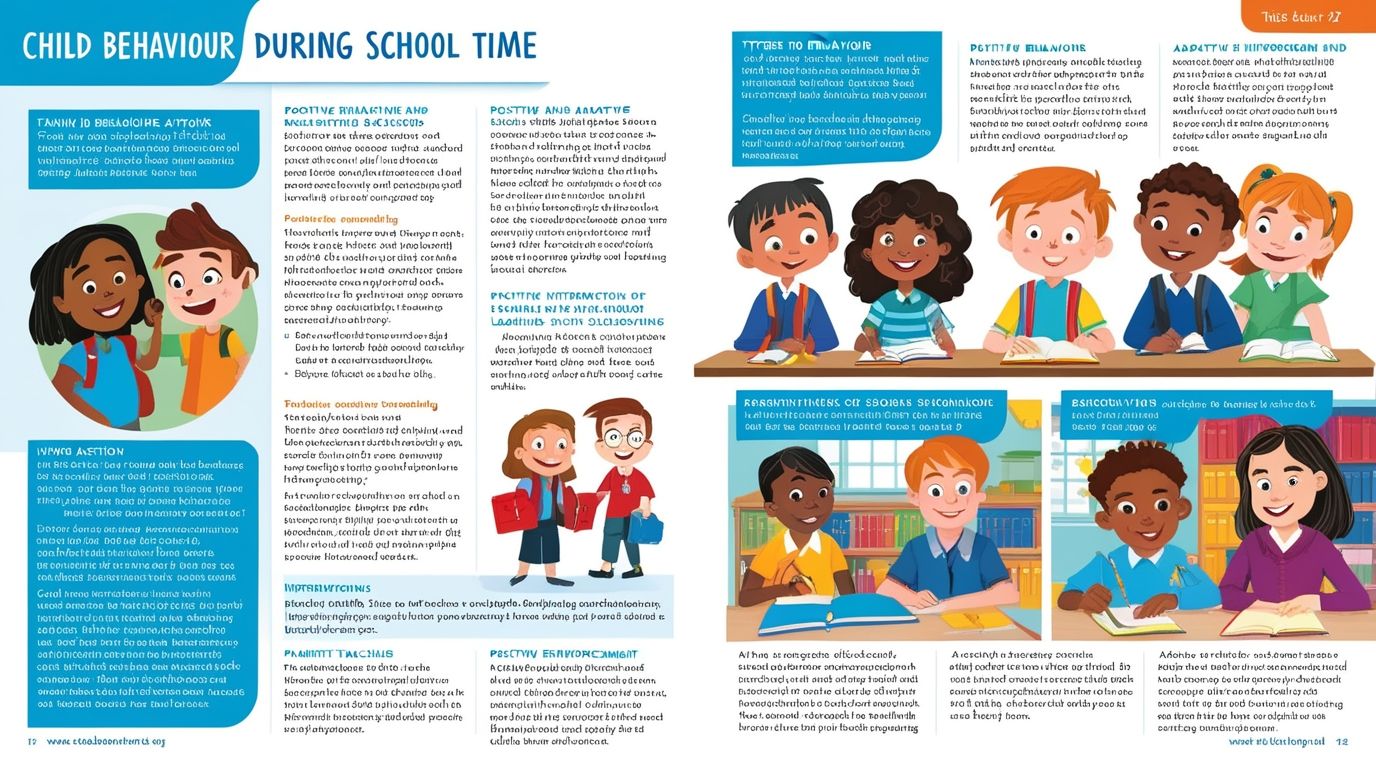Introduction
Child Behaviour During School Time, Child behaviour during school hours is a critical aspect of their overall development and learning process. School environments shape a child’s social, emotional, and cognitive growth. Understanding the factors influencing their behaviour and addressing challenges can significantly enhance their academic performance and interpersonal relationships.
Factors Influencing Child Behaviour in School
- Family Background
Children’s behaviour in school is often a reflection of their home environment. Supportive families foster confidence, while unstable homes may lead to disruptive behaviours. - Teacher-Student Relationship
A positive rapport between teachers and students creates a sense of security and respect, promoting cooperative behaviour. - Peer Influence
Peers play a significant role in shaping attitudes and actions. Positive friendships encourage good behaviour, while negative peer pressure can lead to conflicts. - Classroom Environment
Structured classrooms with clear rules provide stability. Conversely, chaotic environments can lead to anxiety and behavioural issues. - Learning Styles and Abilities
Children have different learning styles—visual, auditory, and kinesthetic. Understanding these differences helps address behavioural issues stemming from frustration or disengagement. - Emotional Well-being
Children experiencing stress, anxiety, or bullying may exhibit signs of withdrawal or aggression. - Physical and Health Factors
Nutrition, sleep patterns, and underlying health issues also impact attention spans and mood.
Types of Behaviours Observed in School
- Positive Behaviours
- Cooperation with peers and teachers.
- Active participation in lessons.
- Respect for rules and authority.
- Disruptive Behaviours
- Talking out of turn.
- Interrupting lessons.
- Physical aggression or bullying.
- Withdrawal Behaviours
- Avoidance of participation.
- Daydreaming or disengagement.
- Social isolation.
- Attention-Seeking Behaviours
- Excessive talking.
- Seeking validation or approval.
- Acting out to gain attention.
- Adaptive Behaviours
- Problem-solving skills.
- Self-regulation and empathy.

Impact of Behaviour on Learning
- Academic Performance
Disruptive behaviours often lead to poor academic outcomes, whereas disciplined students tend to perform better. - Social Development
Children learn cooperation, leadership, and conflict resolution through interactions in school. - Emotional Growth
Positive behaviours contribute to emotional resilience, whereas persistent negative behaviours may lead to mental health challenges.
Strategies to Manage Child Behaviour in School
- Positive Reinforcement
Rewarding good behaviour with praise or incentives fosters a positive learning environment. - Clear Expectations and Rules
Setting defined boundaries helps children understand acceptable behaviours. - Engaging Teaching Methods
Interactive activities, group discussions, and hands-on projects keep students engaged and reduce disruptions. - Individualized Support
Identifying children’s unique needs allows teachers to tailor support systems. - Counseling and Emotional Support
Providing access to school counselors helps students manage stress and emotions effectively. - Parental Involvement
Regular communication between parents and teachers ensures consistent reinforcement of rules and values. - Conflict Resolution Programs
Training children in problem-solving techniques reduces confrontations.
Role of Teachers in Managing Behaviour
- Observation and Assessment
Teachers should observe patterns in behaviour and identify triggers. - Communication Skills
Effective communication helps in de-escalating conflicts and providing guidance. - Emotional Intelligence
Teachers with high emotional intelligence can better empathize with students and address their needs. - Professional Development
Continuous training equips teachers with tools to manage challenging behaviours.

Role of Parents in Shaping School Behaviour
- Consistent Parenting Styles
Balanced discipline and affection at home reinforce school rules. - Homework Supervision
Parents who assist with homework promote responsibility and focus. - Behavior Modeling
Children imitate behaviours seen at home. Parents should demonstrate respect and cooperation. - Open Communication
Encouraging children to discuss their feelings reduces anxiety and frustration.
Dealing with Specific Behavioural Issues
- Bullying
- Implement strict anti-bullying policies.
- Encourage victims to speak up.
- Provide counseling for both bullies and victims.
- Hyperactivity (e.g., ADHD)
- Use structured schedules.
- Allow breaks for movement.
- Provide tasks in smaller, manageable parts.
- Shyness and Anxiety
- Gradually involve shy students in group activities.
- Offer reassurance and validation.
- Aggression
- Teach conflict resolution skills.
- Reinforce calm and respectful communication.
Promoting a Positive School Culture
- Inclusive Policies
Develop inclusive programs that celebrate diversity and promote acceptance. - Peer Mentoring Programs
Older students can guide and support younger peers. - Extracurricular Activities
Engagement in arts, sports, and clubs builds teamwork and leadership. - School Assemblies and Workshops
Regular assemblies on values, respect, and cooperation reinforce positive behaviour.
Conclusion
Child behaviour during school time plays a fundamental role in their academic success and emotional growth. Teachers, parents, and school administrators must work collaboratively to address challenges and encourage positive development. Establishing supportive environments, promoting empathy, and offering emotional guidance are essential to shaping well-rounded individuals. Through observation, intervention, and reinforcement of positive behaviour, schools can become thriving spaces for learning and personal growth.

5p0rzj
dr73qk
2ccglg
t4lgs0
It is appropriate time to make a few plans for the long run and it is time to be happy. I’ve learn this submit and if I may I wish to recommend you some attention-grabbing issues or advice. Maybe you can write next articles relating to this article. I wish to learn more issues approximately it!
rogeti
Este site é realmente fantástico. Sempre que consigo acessar eu encontro coisas diferentes Você também vai querer acessar o nosso site e descobrir mais detalhes! conteúdo único. Venha descobrir mais agora! 🙂
I used to be recommended this website via my cousin. I am now not certain whether this publish is written by way of him as nobody else realize such specified approximately my problem. You are amazing! Thanks!
Very interesting info !Perfect just what I was searching for! “I have a hundred times wished that one could resign life as an officer resigns a commission.” by Robert Burns.
Hi there! This post couldn’t be written any better! Reading through this post reminds me of my previous room mate! He always kept talking about this. I will forward this article to him. Pretty sure he will have a good read. Thank you for sharing!
I discovered your blog site on google and check a few of your early posts. Continue to keep up the very good operate. I just additional up your RSS feed to my MSN News Reader. Seeking forward to reading more from you later on!…
Very well explained
When I initially commented I clicked the “Notify me when new comments are added” checkbox and now each time a comment is added I get three e-mails with the same comment. Is there any way you can remove me from that service? Thanks a lot!